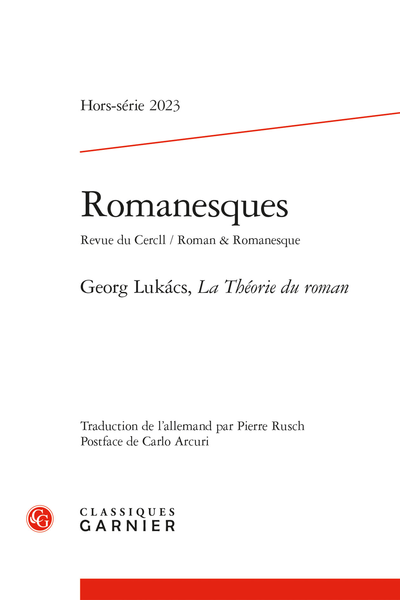
Sommaire
- Type de publication : Article de revue
- Revue : Romanesques hors-série
2023. Georg Lukács, La Théorie du roman - Pages : 7 à 13
- Revue : Romanesques
- Thème CLIL : 4027 -- SCIENCES HUMAINES ET SOCIALES, LETTRES -- Lettres et Sciences du langage -- Lettres -- Etudes littéraires générales et thématiques
- EAN : 9782406170075
- ISBN : 978-2-406-17007-5
- ISSN : 2271-7242
- DOI : 10.48611/isbn.978-2-406-17007-5.p.0007
- Éditeur : Classiques Garnier
- Mise en ligne : 07/05/2024
- Périodicité : Semestrielle
- Langues : Français, Anglais
SOMMAIRE
Christophe Reffait
Note éditoriale 15
GEORG LUKÁCS, LA THÉORIE DU ROMAN
Traduction par Pierre Rusch
Avant-propos 21
I. Les formes de la grande poésie épique dans leur relation avec
la culture globale, selon qu’elle présente un caractère fermé
sur elle-même ou au contraire problématique 35
1.Les cultures closes 35
La structure de l ’ hellénité ; Son évolution dans la perspective de la philosophie de l ’ histoire ; Le christianisme
2.Le problème d’une approche des formes littéraires
dans la perspective de la philosophie de l’histoire 43
Principes généraux ; La tragédie ; Les formes épiques
3.Épopée et roman 57
Le vers et la prose comme moyens d ’ expression ; La totalité comme donnée et comme tâche ; Le monde des constructions objectives ; Le type héroïque
84. La forme intérieure du roman 68
Son abstraction fondamentale et les dangers qui en résultent ; Sa nature processuelle ; L’ironie comme principe formel ; La structure contingente du monde romanesque et la forme biographique ; Le caractère représentable du monde romanesque et les moyens de sa représentation ; L’extension intérieure du roman
5. Conditionnement et signification du roman
au plan de la philosophie de l’histoire 79
Signification du roman ; L’intention du roman ; Le démonique ; La place du roman au plan de la philosophie de l’histoire ; L’ironie comme mystique
II. Essai de typologie de la forme romanesque 87
1.L’idéalisme abstrait 87
Les deux types principaux ; Don Quichotte ; Sa relation avec l’épopée chevaleresque ; Les successeurs de Don Quichotte : a) la tragédie de l’idéalisme abstrait b) le roman humoristique moderne et sa problématique ; Balzac ; Pierre le Chanceux, de Pontoppidan
2.Le romantisme de la désillusion 100
Le problème du romantisme de la désillusion et sa signification pour la forme du roman ; Les tentatives de solution de Jacobsen et de Gontcharov ; L’Éducation sentimentale et le problème du temps dans le roman ; Retour sur le problème du temps dans le roman de l’idéalisme abstrait
3. Les Années d ’ apprentissage de Wilhelm Meister
comme tentative de synthèse 116
Le problème ; L’idée de communauté sociale et les formes de sa représentation ; Le monde du roman d’éducation et la romantisation de la réalité ; Novalis ; La tentative goethéenne de solution et le mouvement du roman se transcendant en épopée
4.Tolstoï et le dépassement des formes sociales de la vie 125
L’élaboration littéraire de la polémique contre la convention ; La conception tolstoïenne de la nature et ses conséquences problématiques pour la forme du roman ; Position double de Tolstoï dans la succession historico-philosophique des formes épiques : ouverture sur Dostoïevski
9POSTFACE
Carlo Arcuri
Le roman est-il nécessaire ? 137
Index des noms cités dans le texte de Lukács 159
Résumés 161
10 11contents
Christophe Reffait
Editorial Note 15
GEORG LUKÁCS, THE THEORY OF THE NOVEL
translation by Pierre Rusch
Foreword 21
I. Exploring forms of great epic poetry in relation
to the general civilization, whether it is integrated
or, on the contrary, problematic 35
1. Integrated civilizations 35
The structure of the world of ancient Greece; Its development from a philosophy of history perspective; Christianity
2. The problem of a literary-forms approach
in the philosophy of history 43
General principles; Tragedy; Epic forms
3. The epic and the novel 57
Poetry and prose as means of expression; Totality as given and as an undertaking; The world of objective constructions; The heroic type
124 . The internal form of the novel 68
Its fundamental abstraction and the ensuing risks; Its processual nature; Irony as a formal principle; The contingent structure of the novelistic world and biographical form; The representability of the novelistic world and the means of its representation; The internal extension of the novel
5 . The conditioning and significance of the novel
in the philosophy of history 79
Significance of the novel; The intention of the novel; The demonic; The novel ’ s place in the philosophy of history; Irony as mysticism
II. Attempt at a typology of the novel form 87
1. Abstract idealism 87
The two principal types; Don Quixote; Its relationship to the chivalric epic; The successors to Don Quixote: a) the tragedy of abstract idealism b) the modern humorous novel and the issues surrounding it; Balzac; Lucky Per by Pontoppidan
2. The romanticism of disillusionment 100
The problem of the romanticism of disillusionment and its implications for the form of the novel; Jacobsen ’ s and Gontcharov ’ s attempts at a solution; L ’ Éducation sentimentale and the problem of time in the novel; Re-examining the problem of time in the novels of abstract idealism
3. Wilhelm Meister ’ s Years of Apprenticeship
as an attempted synthesis 116
The problem; The idea of social community and the forms of its representation; The world of the bildungsroman and the romanticism of reality; Novalis; Goethe ’ s attempt at a solution and the process by which the novel transcends itself to become an epic
4. Tolstoy and going beyond social forms of life 125
The development of the novel as polemic against convention; Tolstoy ’ s conception of nature and its problematic consequences for the novel form; Tolstoy ’ s dual position in the historico-philosophical succession of epic forms: an opening to Dostoevsky
13AFTERWORD
Carlo Arcuri
Is the novel necessary? 137
Index of names cited in the text by Lukács 159
Abstracts 161